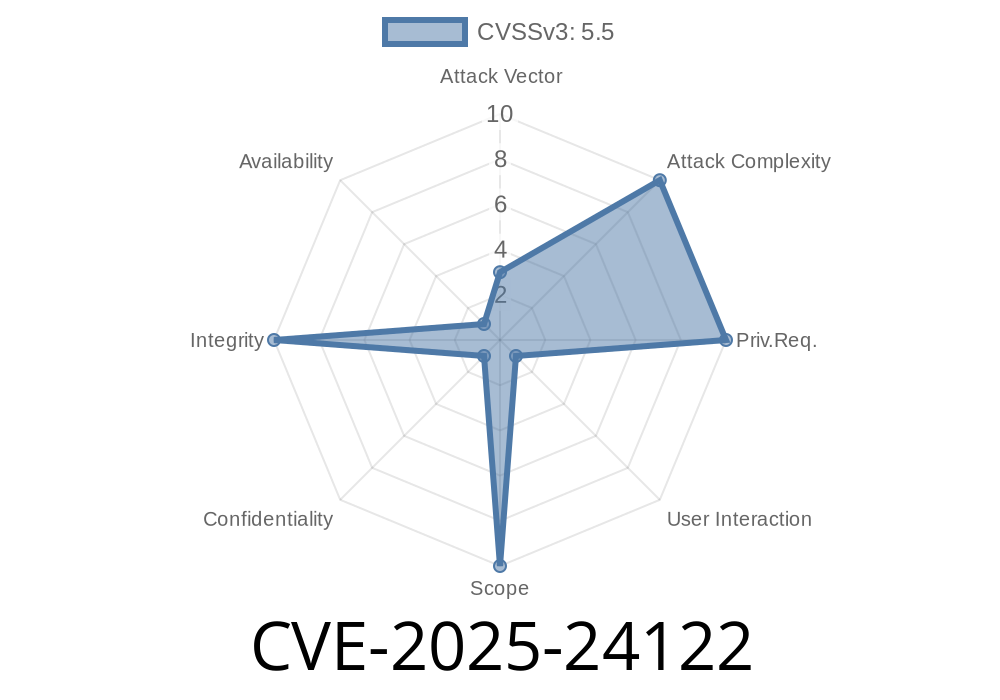CVE-2025-24122 is a newly published vulnerability that impacts Intel-based Mac computers. This flaw allowed unauthorized applications to meddle with protected areas of the file system. Apple has since patched this issue in macOS Ventura 13.7.3, macOS Sonoma 14.7.3, and macOS Sequoia 15.3. In this post, I’ll break down what was wrong, why it mattered, and how an exploit could look—with code examples. We’ll also explore how Apple’s fix worked. You’ll find official references linked throughout.
What Was CVE-2025-24122?
Most modern versions of macOS use a mechanism called System Integrity Protection (SIP), which protects important system files—even from apps with admin privileges. At the heart of this protection is code signing: only Apple-signed (or otherwise trusted) code can modify certain parts of the system.
However, CVE-2025-24122 exposed a subtle downgrade vulnerability. On Intel Macs, an attacker could supply certain binaries or manipulate the code-signing environment in a way that tricked macOS into letting an untrusted app write to files it should never touch.
Apple’s note says
> _“A downgrade issue affecting Intel-based Mac computers was addressed with additional code-signing restrictions... An app may be able to modify protected parts of the file system._”
> — Apple Security Updates, June 2025
Here, “downgrade issue” means that macOS could be coaxed into operating with older, less-strict code-signing policies on newer systems, mostly when launching or verifying legacy binaries. This created a hole in SIP.
How Could It Be Exploited?
Suppose a malicious app included a copy of an older, weakly signed Apple system binary—one that had legitimate rights under macOS Catalina, but not on Sonoma or Ventura.
They invoke it in a way that triggers system-level operations—like changing system config files.
3. Due to the downgrade bug, SIP might honor the old entitlements of that binary instead of enforcing current rules.
Below is a simplified exploit snippet (conceptual, educational use only)
import Foundation
let fileManager = FileManager.default
let protectedPath = "/System/Library/SomeProtectedFile.plist"
let legacyBinaryPath = Bundle.main.path(forResource: "OldSystemTool", ofType: nil)!
let task = Process()
task.launchPath = legacyBinaryPath
task.arguments = ["--modify", protectedPath]
task.launch()
task.waitUntilExit()
if fileManager.fileExists(atPath: protectedPath) {
print("Protected system file was modified!")
} else {
print("Access denied or file not found.")
}
NOTE: In practice, Apple’s protections are extensive. Final exploits are much more complex.
How Did Apple Fix It?
Apple’s fix is tight and simple: Don’t allow older, weaker code signatures—no matter what. The updated macOS versions (Ventura 13.7.3, Sonoma 14.7.3, Sequoia 15.3) now perform stricter code-signing checks, closing the loophole where the system “downgraded” its security expectations.
If you try to run a legacy signed binary to perform privileged actions after these updates, SIP will stop the request cold—no matter what entitlements the binary once had.
Go to System Settings → General → Software Update and install the latest version.
- Developers: Check your installers, deployment scripts, and custom system tools—make sure they don’t rely on legacy binaries.
Official References
- Apple Security Updates (June 2025)
- CVE-2025-24122 entry on MITRE (link may be pending)
Conclusion
CVE-2025-24122 was a result of macOS sometimes accepting old, weak code signatures, allowing attackers rare access to protected files. Apple’s updates now enforce the rules as they should, so the attack is dead in the water. If you use an Intel Mac, patch now to stay safe.
*Want more in-depth Apple security breakdowns? Let us know in the comments!*
Timeline
Published on: 01/27/2025 22:15:17 UTC
Last modified on: 03/03/2025 22:45:38 UTC
